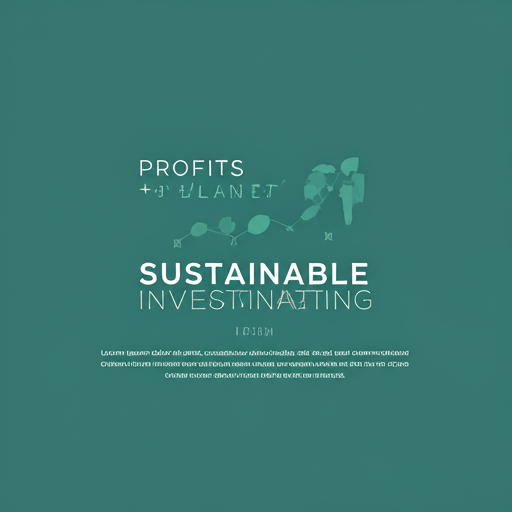Sustainable Investing: Balancing Profits and Environmental Impact
Introduction to Sustainable Investing
Sustainable investing focuses on generating financial returns while considering environmental impacts. This approach encourages investors to support companies that prioritize ecological responsibility. It aligns profit motives with the need for a healthier planet. Many investors seek to make a positive difference. This is a growing trend.
Importance of Environmental Considerations
Environmental considerations are crucial in sustainable investing. They influence risk assessment and long-term viability. Investors must evaluate companies based on their ecological footprint. This includes carbon emissions, resource usage, and waste management.
Key factors include:
These metrics guide informed investment decisions. He believes this approach enhances portfolio resilience. It’s a smart strategy.
The Role of Cryptocurrency in Sustainable Investing
How Cryptocurrencies Can Support Green Initiatives
Cryptocurrencies can significantly support green initiatives. They enable transparent funding for sustainable projects. This transparency fosters trust among investors and stakeholders. Many blockchain platforms prioritize eco-friendly practices. He sees this as a positive trend. It encourages innovation in renewable energy. Sustainable solutions are essential for the future.
Challenges of Energy Consumption in Crypto Mining
Crypto mining poses significant energy consumption challenges. This process often relies on fossil fuels. High energy demands lead to increased carbon emissions. Many miners are seeking renwwable energy sources. He believes this shift is necessary. Sustainable practices can mitigate environmental impacts. It’s a pressing issue.
Evaluating Sustainable Cryptocurrencies
Criteria for Assessing Environmental Impact
Assessing environmental impact requires specific criteria. Key factors include energy consumption and carbon emissions. He emphasizes the importance of renewable energy use. Additionally, waste management practices are critical. These elements provide a comprehensive evaluation. Sustainable cryptocurrencies should prioritize ecological responsibility. This is essential for long-term viability.
Examples of Eco-Friendly Cryptocurrencies
Several cryptocurrencies exemplify eco-friendly practices. For instance, Cardano utilizes a proof-of-stake consensus mechanism. This significantly reduces energy consumption compared to traditional mining. Another example is Algorand, which focuses on carbon neutrality. He finds these initiatives commendable. They demonstrate a commitment to sustainability. These cryptocurrencies attract environmentally conscious investors.
Regulatory Landscape for Sustainable Investments
Current Regulations Affecting Cryptocurrency
Current regulations significantly impact cryptocurrency markets. Governments are increasingly focusing on compliance and transparency. This includes anti-money laundering (AML) and know-your-customer (KYC) requirements. He believes these measures enhance market integrity. Regulatory clarity can attract institutional investors. It’s a necessary evolution for the industry.
Future Trends in Sustainable Investment Regulations
Future trends indicate stricter sustainable investment regulations. Policymakers are likely to emphasize environmental, social, and governance (ESG) criteria. This shift aims to enhance accountability and transparency. He anticipates increased reporting requirements for companies. Investors will demand more rigorous sustainability assessments. It’s a necessary change for the market.
Case Studies of Successful Sustainable Crypto Projects
Highlighting Innovative Projects
Several innovative projects exemplify sustainable crypto initiatives. For instance, Power Ledger enables peer-to-peer energy trading. This model promotes renewable energy usage and efficiency. Another example is SolarCoin, rewarding solar energy production. He finds these projects transformative. They align financial incentives with environmental goals. Such initiatives can drive market adoption.
Lessons Learned from These Initiatives
Successful sustainable crypto projects offer valuable insights. First, collaboration among stakeholders enhances project viability. Second, clear regulatory frameworks foster innovation. Third, transparency builds trust with investors. He believes these factors are crucial. They ensure long-term sustainability. Lessons from these initiatives are significant.
Investment Strategies for Sustainable Cryptocurrencies
Diversifying Your Portfolio with Green Assets
Diversifying a portfolio with green assets is essential. This strategy mitigates risk while promoting sustainability. He recommends allocating funds to eco-friendly cryptocurrencies. Additionally, investors should consider renewable energy projects. These investments align financial returns with environmental goals. It’s a prudent approach for future growth.
Long-Term vs. Short-Term Investment Approaches
Long-term investment approaches focus on sustainability. They prioritize stable growth and environmental impact. In contrast, short-term strategies seek quick returns. He believes both methods have merit. Diversification can balance these approaches. Investors should assess their risk tolerance. This is crucial for informed decisions.
The Impact of Community and Governance
Role of Community in Sustainable Projects
Community involvement is vital for sustainable projects. Engaged stakeholders enhance project success and accountability. They provide valuable insights and resources. Additionally, community governance fosters transparency and trust. He believes this collaboration is essential. It strengthens the project’s impact. Active participation leads to better outcomes.
Decentralized Governance and Environmental Responsibility
Decentralized governance enhances environmental responsibility in projects. It allows for collective decision-making and accountability. This structure empowers communities to influence outcomes. He believes this approach fosters sustainable practices. Active participation leads to better environmental stewardship. It’s a necessary evolution for governance.
Conclusion: The Future of Sustainable Investing in Cryptocurrency
Balancing Profitability and Environmental Impact
Balancing profitability with environmental impact is essential. Investors increasingly seek sustainable options. This trend drives innovation in cryptocurrency. He believes this balance is achievable. Sustainable practices can enhance long-term returns. It’s a win-win situation for all.
Call to Action for Investors and Developers
Investors and developers must prioritize sustainability. They should actively seek eco-friendly projects. Collaboration can drive innovation in this space. He encourages a focus on long-term impact. Sustainable investments can yield significant returns. This is a critical opportunity for growth.
